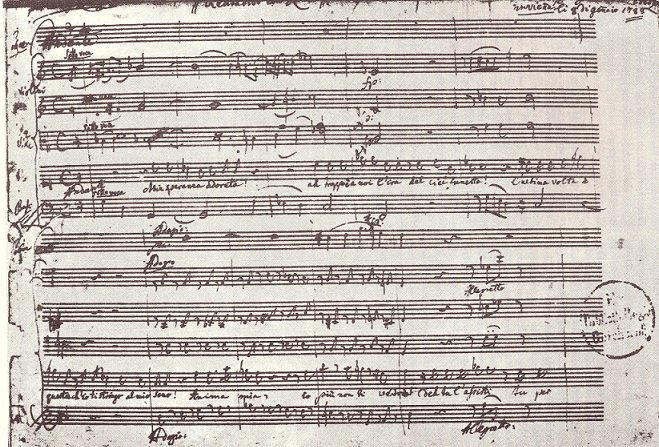Recitative and rondo soprano ‘Mia Speranza adorate—Ah, non sai, qual pena’ for soprano, two violins, two violas, basso and oboe. Composed for Aloysia Lange and dated 8 January 1783. Mozart’s inscription on the autograph, now at the Staatsbibliothek zu Berlin, reads: ‘per la Sigra Lange. Recitativo con Rondo. Di Wolfgango Amadeo Mozart in Vienna li 8 di gennaio 1783.’ The text derives from Pasquale Anfossi’s Zemira, act II, scene 5, first given at S. Benedetto, Venice, during the 1782/3 carnival season:
| Mia speranza adorata! | My adored hope! | |
| Ah! troppo è a noi l’ira del ciel funesta; | Ah! the wrath of heaven is too dire to us! | |
| L’ultima volta è questa, | This is the last time | |
| Ch’io ti stringo al mio seno. | that I shall hold you to my breast! | |
| Anima mia, Io più non ti vedrò. | My soul, I shall see you no more. | |
| Deh, tu l’assisti, tu per me la consola. | You there, help her, console her for me. | |
| Addio, Zemira, Ricordati di me! | Farewell, Zemira, remember me! | |
| Senti . . . che vedo? . . . | Hear me… what’s this? . . . | |
| Tu piangi, o mio tesoro! | You are weeping, my darling! | |
| Oh, quanto accresce quel pianto il mio martir! | Oh, how those tears increase my suffering! | |
| Chi prova mai Stato peggior del mio | Who ever found himself in worse straits than I? | |
| Addio per sempre, amata sposa, addio! | Farewell for ever, for ever, dear wife, farewell! | |
| Ah non sai qual pena sia Il doverti, | Ah! You do not know what anguish it is | |
| oh Dio! lasciar! | oh, God! To have to leave you! | |
| Ma quel pianto, anima mia | But those tears, my dearest, | |
| Fa più grave il mio penar. | make my suffering harder. | |
| Deh, mi lascia, oh fier momento! | If only the terrible moment would pass! | |
| Cara sposa, ah, ch’io mi sento | Dear wife! Ah, but I feel | |
| Per l’affanno il cor mancar! | my heart fail me with grief. | |
| A quai barbare vicende | What a barbarous torment | |
| Mi serbaste, avversi Dei, | you have prepared me for, hostile gods! | |
| Dite voi, se i casi miei | Tell me, if my circumstances | |
| Non son degni di pietà. | are unworthy of pity. |

W. A. Mozart, ‘Mia Speranza adorate—Ah, non sai, qual pena’ K416, first page of the autograph score (Berlin, Staatsbibliothek zu Berlin]
Mozart mentions K416 in a letter to his father of 8 January 1783: ‘. . . I have to finish a rondo this evening for my sister-in-law Lange, which she is to sing on Saturday [11 January] at a big concert in the Mehlgrube.’ Lange also sang the aria at Mozart’s 23 March 1783 Burgtheater concert.